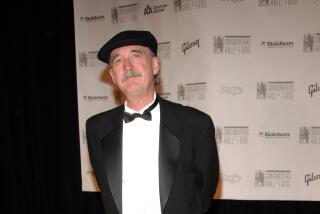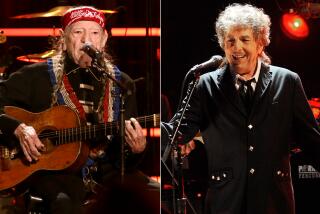Jennings’ Boxed Set: The ‘Daddy’ of Fine Vocals
- Share via
Waylon Jennings’ “Only Daddy That’ll Walk the Line: The RCA Years” is a boxed set, but one with few of the fancy features normally associated with the multi-disc packages.
*
There are no previously unreleased tracks in the two-disc set, and the booklet--with its handful of photos and sketchy essay--is modest by industry standards.
So why is it special?
The answer rests in the sheer dynamics of Jennings’ vocals.
Amid all the justified praise in the last 20 years for such great male country singers as George Jones, Merle Haggard and Willie Nelson, this Texan has often been overlooked.
Sidestepping the rural, “hillbilly” twang associated with Jones, Jennings’ vocals have the rock-accented edge that you would expect from someone who once played behind Buddy Holly.
But that doesn’t mean he’s effective only on upbeat numbers, such as his hit versions of Neil Young’s “Are You Ready for the Country” and Chips Moman and Bobby Emmons’ “Luckenbach, Texas (Back to the Basics of Love).”
In fact, Jennings’ most memorable work may be his ballads, including the most evocative versions you can find of such affecting songs as Kris Kristofferson’s “Lovin’ Her Was Easier (Than Anything I’ll Ever Do Again)” and Bob McDill’s “Amanda.” It was Jennings who, along with pal Willie Nelson, defined in the mid-’70s country music’s colorful outlaw movement--music that celebrated a free-spirited, independent lifestyle.
While the outlaw songs tapped into a restless, anti-Establishment mood among country fans, they also reflected the musicians’ own declaration of independence from the conservative thinking in Nashville in the late ‘60s and early ‘70s.
Jennings was born in 1937 near Lubbock, Tex., the hometown of Buddy Holly, who--during a disagreement with his Crickets band--asked Jennings to join him on bass for the 1959 tour that ended when Holly was killed in a Feb. 14 plane crash. Jennings, in fact, was scheduled to be with Holly on the fatal flight, but he gave up his seat at the last minute to the ailing J.P. Richardson (the Big Bopper).
Jennings spent the next few years playing clubs and bars in the Southwest, finally landing a contract in 1963 with A&M; Records. The label was enthusiastic but had no experience with country artists, and he soon left for the larger RCA in Nashville, where in 1965 he began making the records spotlighted on this collection.
More to Read
The biggest entertainment stories
Get our big stories about Hollywood, film, television, music, arts, culture and more right in your inbox as soon as they publish.
You may occasionally receive promotional content from the Los Angeles Times.










